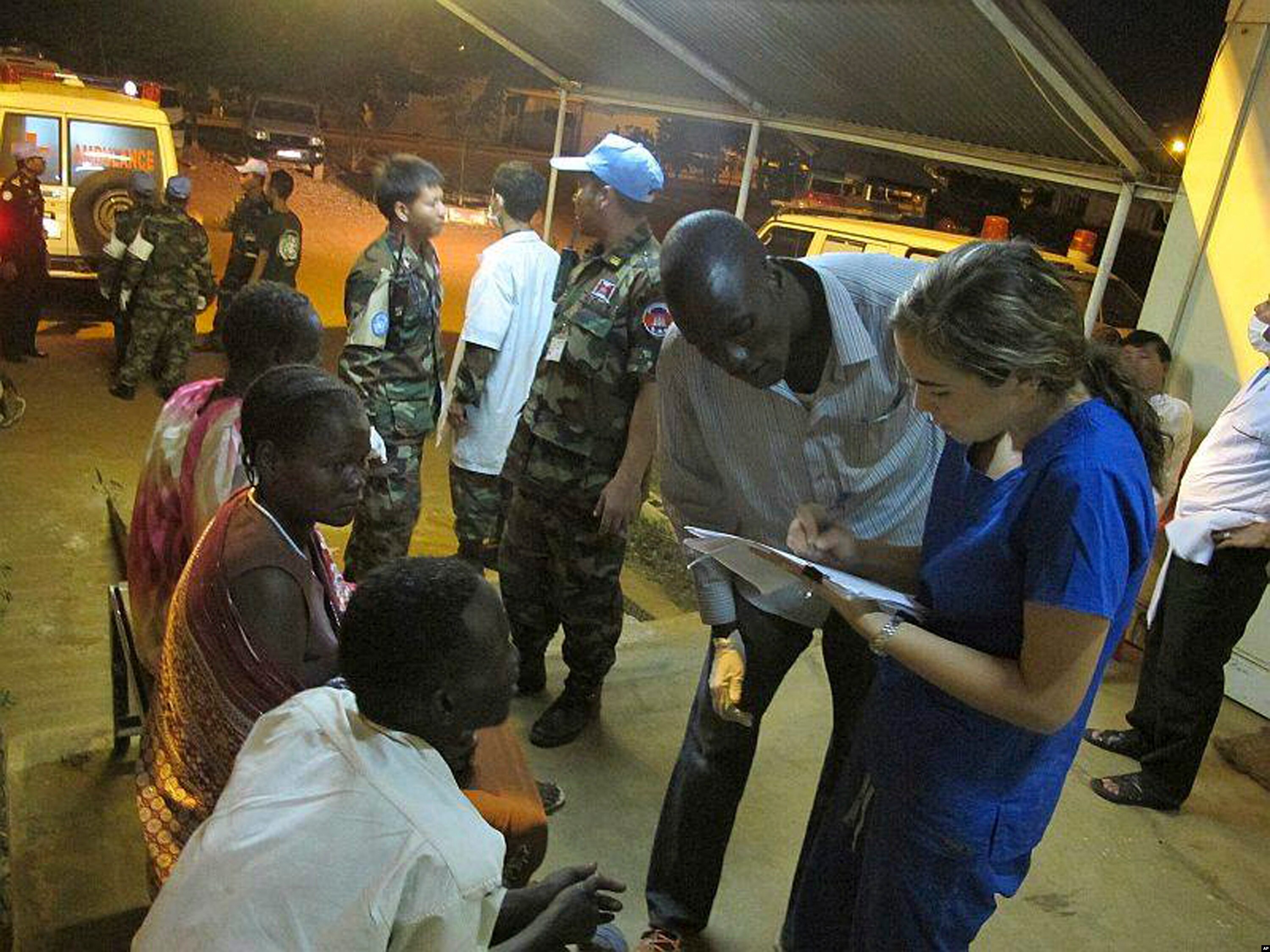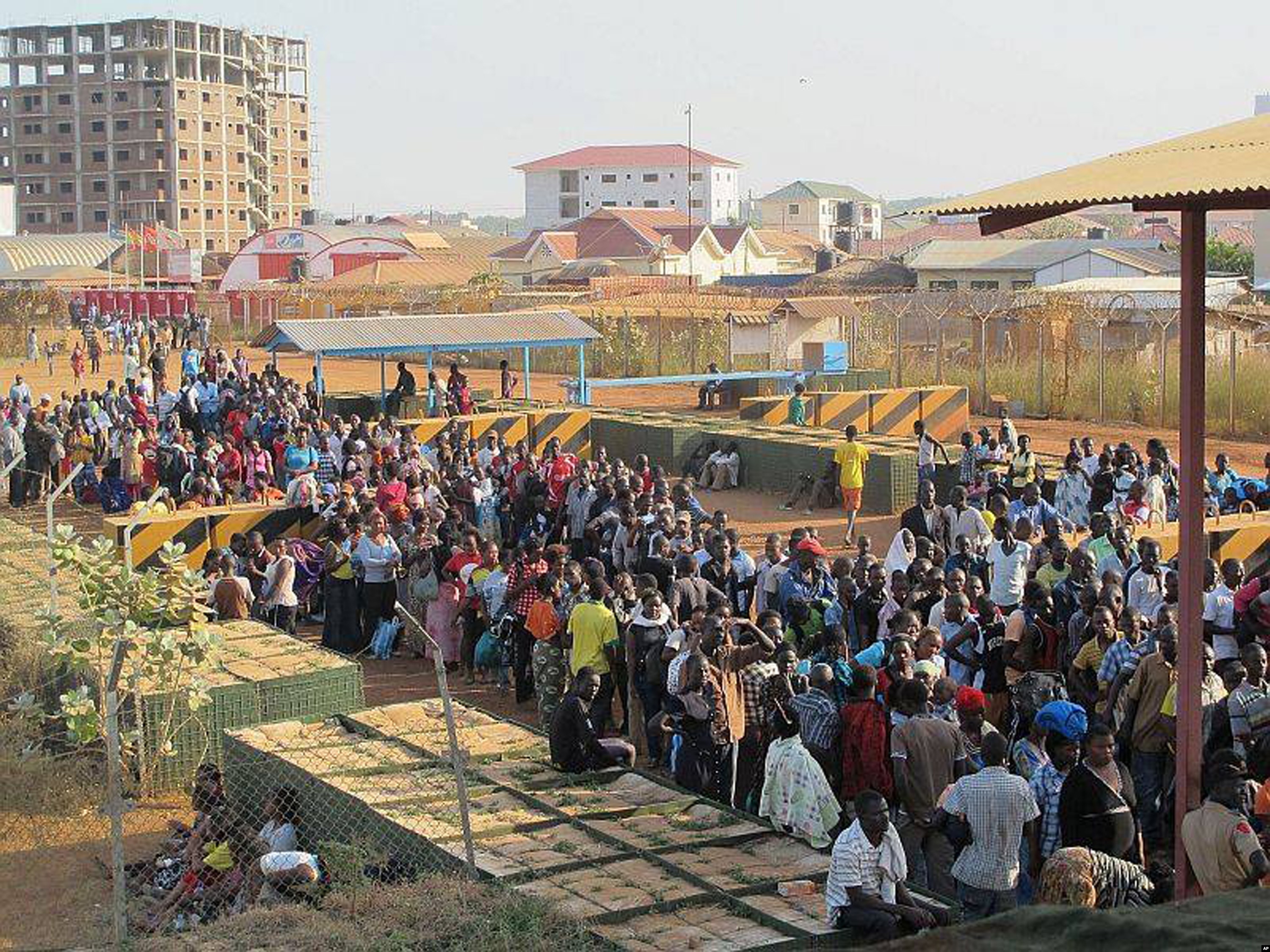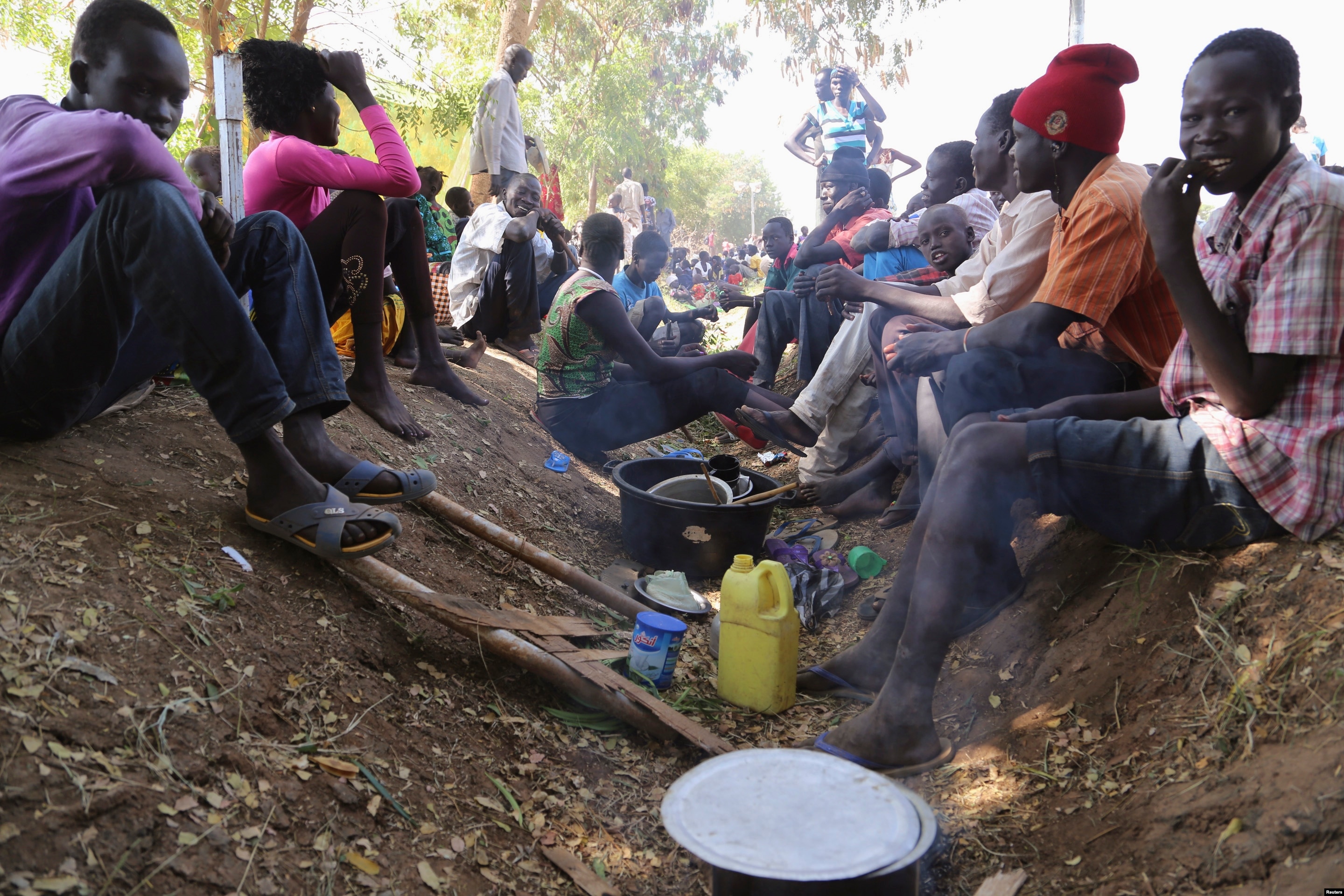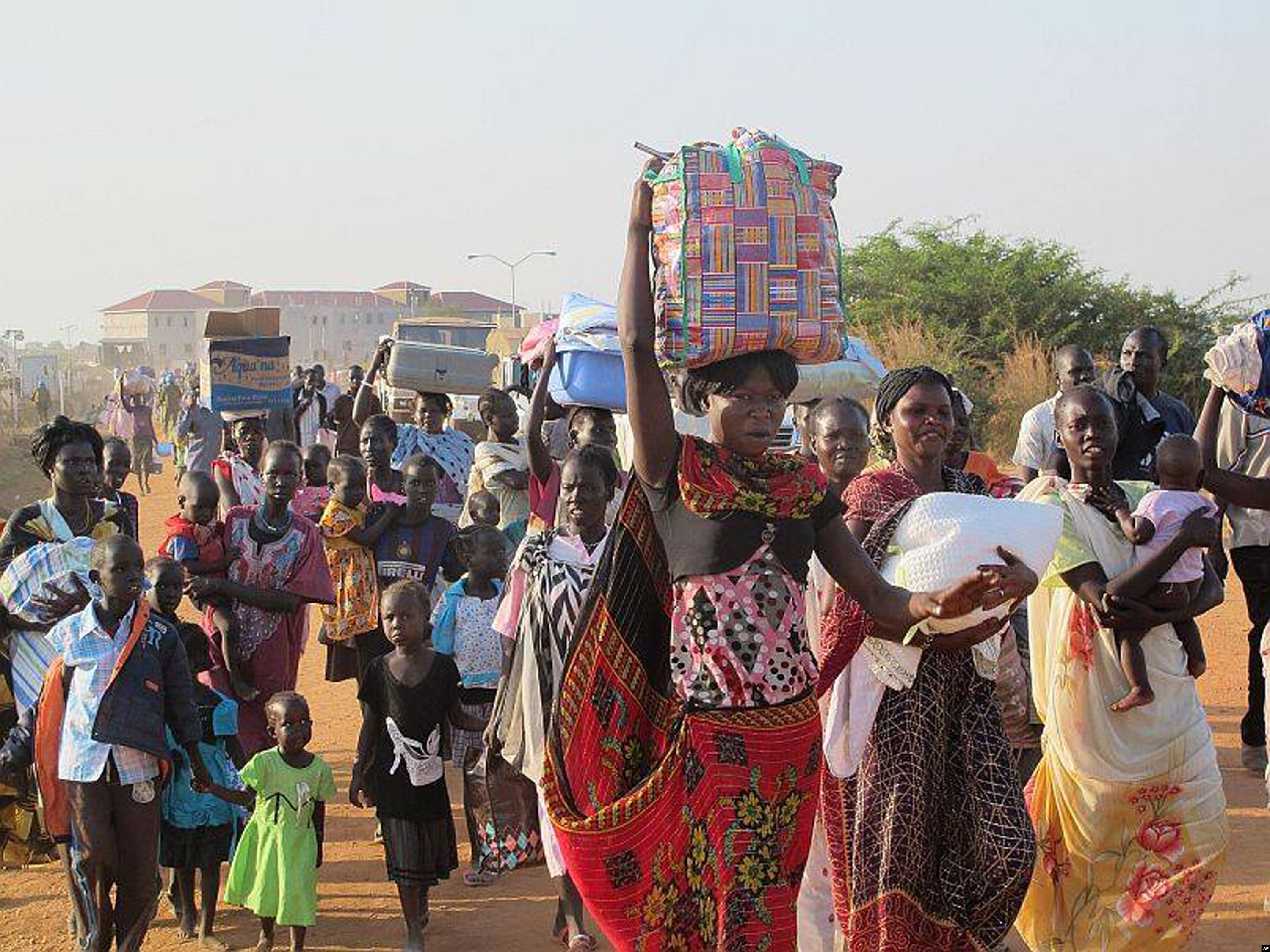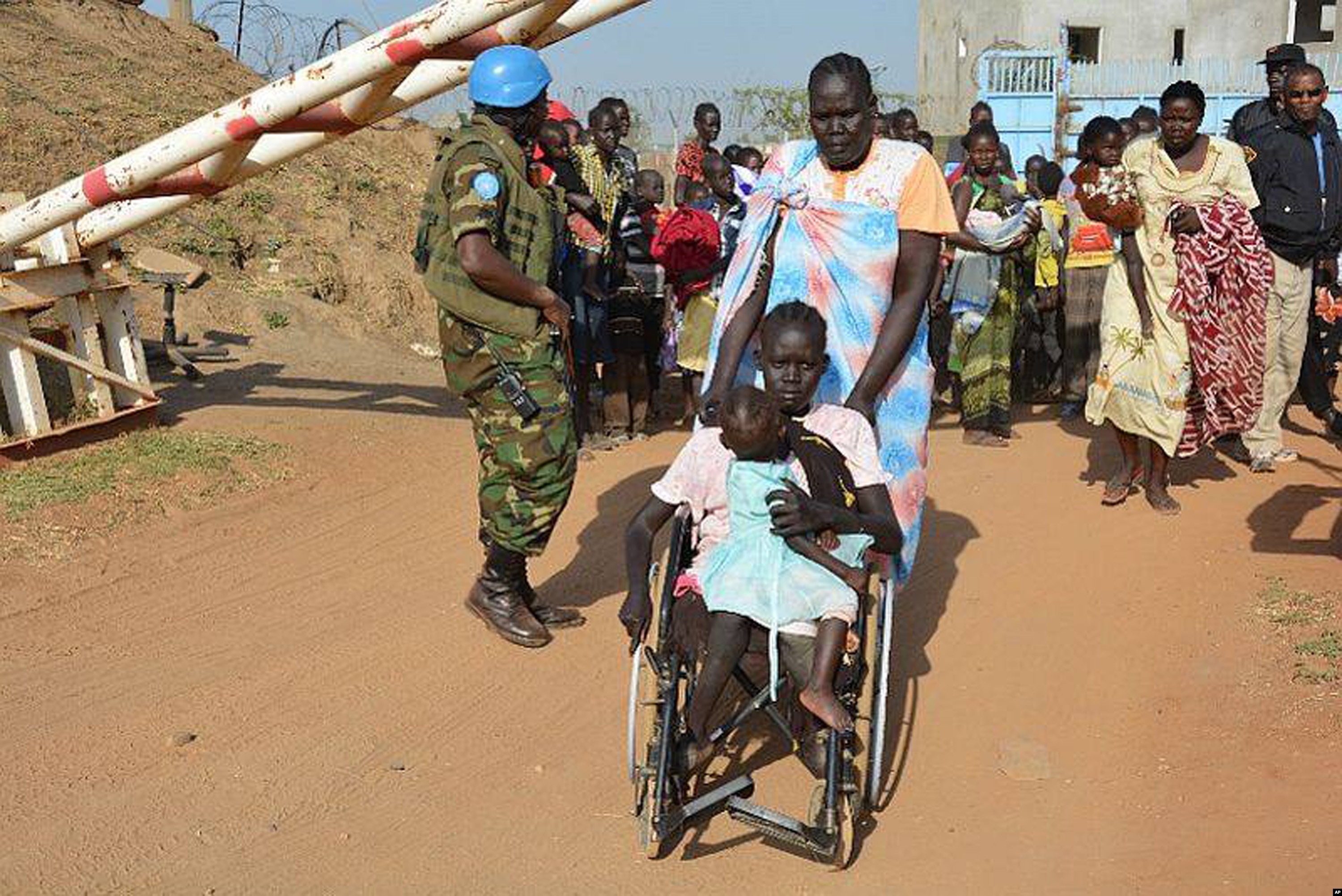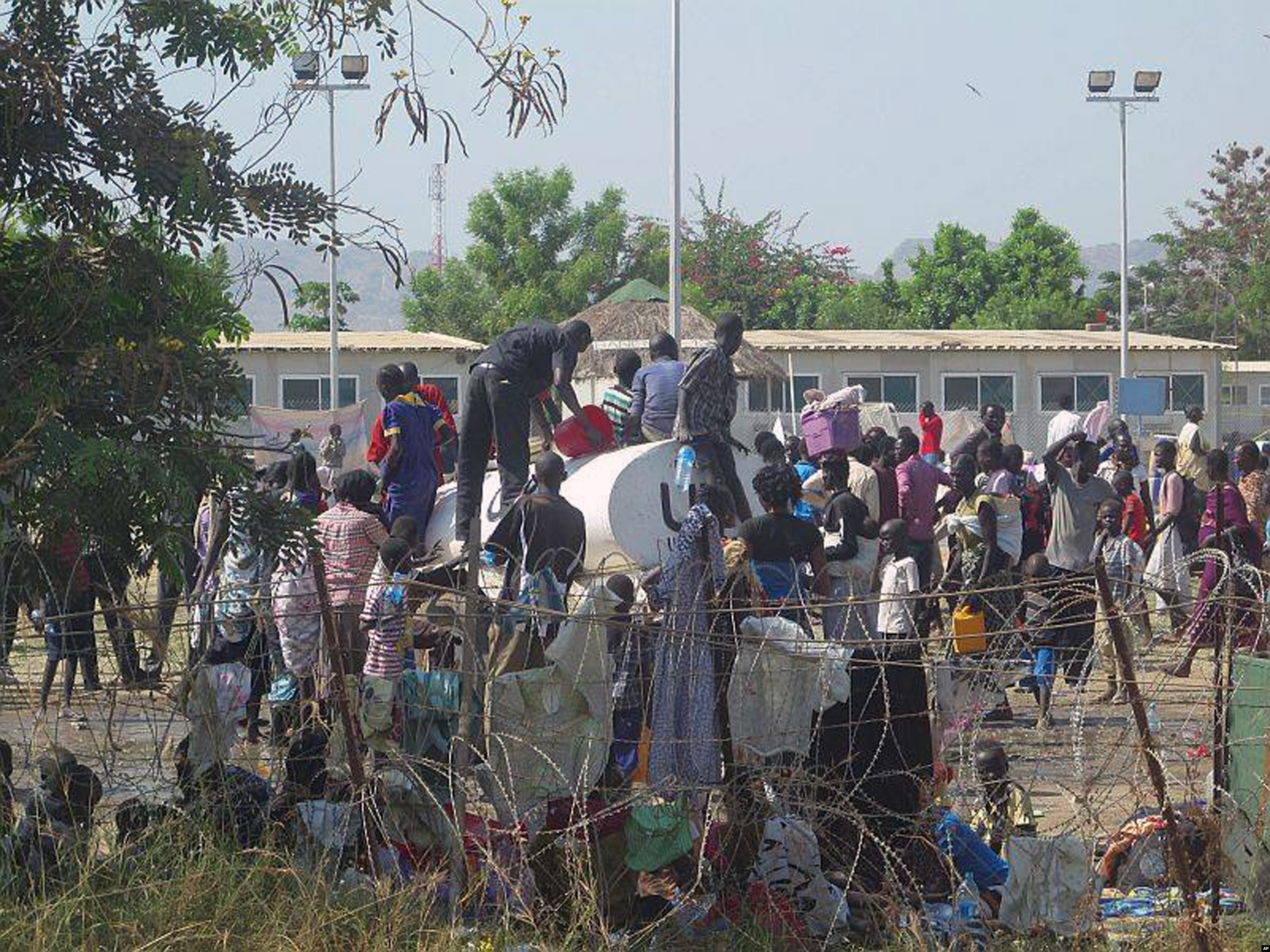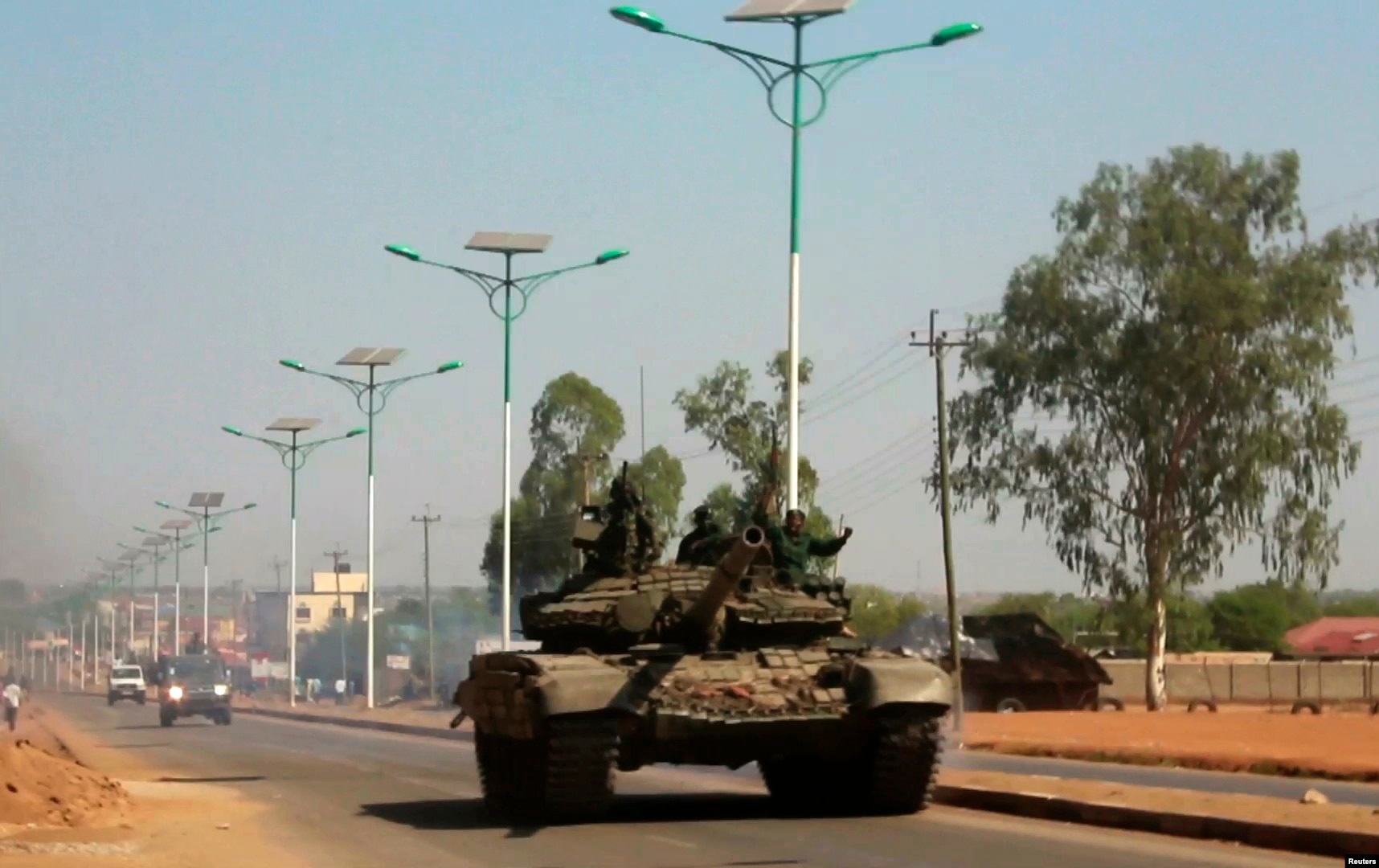▶ South Sudan Conflict: IGAD envoys report progress in negotiations - YouTube: ""
'via Blog this'
Tuesday, December 31, 2013
Monday, December 30, 2013
Sunday, December 29, 2013
African leaders urge talks between S Sudan rivals | Oman Observer

Nairobi — East African leaders yesterday called on South Sudan’s President Salva Kiir and political rival Riek Machar to meet face to face to end the escalating violence in the world’s youngest nation.
Fighting, which erupted on December 15 in capital Juba and spread rapidly to six out of ten states in South Sudan, reportedly claimed hundreds of lives and displaced tens of thousands of people.
The leaders urged Kiir and Machar to meet before year-end, adding that they would not accept South Sudan’s government being toppled through use of military force.
“If hostilities do not cease within four days, the summit will consider further measures,” Ethiopian Foreign Minister Tedros Adhanom told journalists at the end of the meeting in Nairobi.
Heads of state from Kenya, Uganda, Ethiopia, Somalia and Djibouti met with South Sudan’s foreign minister and Sudan’s vice president.
Kiir and his former deputy Machar, whose rebel forces started the conflict, were part of the talks.
Machar, who is in hiding, is demanding that Kiir step down. He has accused the president of being dictatorial, while Kiir has expressed a willingness to negotiate an end to the fighting and to enter talks unconditionally.
“There should be immediate cessation of violence,” Kenyan President Uhuru Kenyatta said during the closed session, according to a tweet by his spokesman Manoah Esipisu.
“South Sudan’s government must guarantee security of all its citizens.” The leaders were meeting as part of an extraordinary summit of the Intergovernmental Authority on Development (IGAD), a day after three-way talks in South Sudan’s capital Juba between Kiir, Kenyatta and Ethiopian Prime Minister Hailemariam Desalegn.
Ethiopia said the Juba meeting had been “constructive.” “IGAD will not allow overthrow of duly and democratically elected democratic government,” Kenyatta said, according to Esipisu.
Ethiopia and Kenya are founding members of IGAD, which includes Djibouti, Somalia, Uganda and Sudan. The bloc was founded in 1986. It has had South Sudan as a member since that country’s independence on July 9, 2011.
The conflict has taken on ethnic dimensions. Kiir belongs to the Dinka, the largest group in South Sudan, and Machar is from the Nuer people.
There have been growing tensions in the ruling Sudan People’s Liberation Movement since independence.
An intensifying power struggle between Kiir, who has a military background with little formal education, and Machar, who has a doctorate from Britain, peaked when key politicians challenged Kiir’s candidacy for the 2015 elections.
That Kiir and Machar come from different ethnic groups and regions within South Sudan caused further political ruptures.
The violence quickly spread to several other states, with fighting being particularly intense in Central Equatoria, Jonglei and Unity states, according to the United Nations Office for the Coordination of Humanitarian Affairs.
At least 92,500 people had been displaced in the conflict, while some 58,000 people have sought shelter at UN peacekeeping bases throughout the country.
Neighbouring Uganda has received more than 7,000 South Sudanese refugees since last week, the Red Cross said. The UN Security Council unanimously adopted a resolution on Tuesday to nearly double its peacekeeping force in South Sudan, adding 5,500 soldiers to the 7,000 already in the country. An additional 1,300 civilian police are to join the mission.
German Foreign Minister Frank-Walter Steinmeier yesterday added his voice to growing calls for an end to the conflict.
“The killing must end,” he said. “The politicians of South Sudan are jointly responsible for ensuring that their young, independent state does not sink into chaos and misery.” — dpa
Fighting, which erupted on December 15 in capital Juba and spread rapidly to six out of ten states in South Sudan, reportedly claimed hundreds of lives and displaced tens of thousands of people.
The leaders urged Kiir and Machar to meet before year-end, adding that they would not accept South Sudan’s government being toppled through use of military force.
“If hostilities do not cease within four days, the summit will consider further measures,” Ethiopian Foreign Minister Tedros Adhanom told journalists at the end of the meeting in Nairobi.
Heads of state from Kenya, Uganda, Ethiopia, Somalia and Djibouti met with South Sudan’s foreign minister and Sudan’s vice president.
Kiir and his former deputy Machar, whose rebel forces started the conflict, were part of the talks.
Machar, who is in hiding, is demanding that Kiir step down. He has accused the president of being dictatorial, while Kiir has expressed a willingness to negotiate an end to the fighting and to enter talks unconditionally.
“There should be immediate cessation of violence,” Kenyan President Uhuru Kenyatta said during the closed session, according to a tweet by his spokesman Manoah Esipisu.
“South Sudan’s government must guarantee security of all its citizens.” The leaders were meeting as part of an extraordinary summit of the Intergovernmental Authority on Development (IGAD), a day after three-way talks in South Sudan’s capital Juba between Kiir, Kenyatta and Ethiopian Prime Minister Hailemariam Desalegn.
Ethiopia said the Juba meeting had been “constructive.” “IGAD will not allow overthrow of duly and democratically elected democratic government,” Kenyatta said, according to Esipisu.
Ethiopia and Kenya are founding members of IGAD, which includes Djibouti, Somalia, Uganda and Sudan. The bloc was founded in 1986. It has had South Sudan as a member since that country’s independence on July 9, 2011.
The conflict has taken on ethnic dimensions. Kiir belongs to the Dinka, the largest group in South Sudan, and Machar is from the Nuer people.
There have been growing tensions in the ruling Sudan People’s Liberation Movement since independence.
An intensifying power struggle between Kiir, who has a military background with little formal education, and Machar, who has a doctorate from Britain, peaked when key politicians challenged Kiir’s candidacy for the 2015 elections.
That Kiir and Machar come from different ethnic groups and regions within South Sudan caused further political ruptures.
The violence quickly spread to several other states, with fighting being particularly intense in Central Equatoria, Jonglei and Unity states, according to the United Nations Office for the Coordination of Humanitarian Affairs.
At least 92,500 people had been displaced in the conflict, while some 58,000 people have sought shelter at UN peacekeeping bases throughout the country.
Neighbouring Uganda has received more than 7,000 South Sudanese refugees since last week, the Red Cross said. The UN Security Council unanimously adopted a resolution on Tuesday to nearly double its peacekeeping force in South Sudan, adding 5,500 soldiers to the 7,000 already in the country. An additional 1,300 civilian police are to join the mission.
German Foreign Minister Frank-Walter Steinmeier yesterday added his voice to growing calls for an end to the conflict.
“The killing must end,” he said. “The politicians of South Sudan are jointly responsible for ensuring that their young, independent state does not sink into chaos and misery.” — dpa
Friday, December 27, 2013
Thursday, December 26, 2013
Thursday, December 19, 2013
South Sudan Army Loses Control of Northern Town
 Medics from the United Nations Mission in the Republic of South Sudan assist civilians at a Cambodian-run hospital in the UNMISS compound, Juba Dec. 18 , 2013. (UNMISS)
Medics from the United Nations Mission in the Republic of South Sudan assist civilians at a Cambodian-run hospital in the UNMISS compound, Juba Dec. 18 , 2013. (UNMISS)
Violence in South Sudan
South Sudan's military announeced that it is no longer in control of Bor, a town north of the capital, after fighting spread there following what the government has called an attempted coup. The South Sudan Red Cross says 19 civilians have been killed in the town.
Meanwhile, the country's information ministry reported that security forces are in "absolute control" of the situation in Juba, the capital. The government says 500 people have been killed there, with at least another 700 wounded since clashes began Sunday.
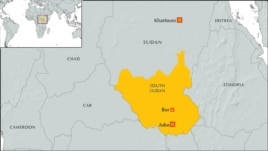 Bor, South Sudan
Bor, South Sudan
President Salva Kiir blames the alleged coup attempt on forces loyal to his former vice president, Riek Machar, whom he fired in July. Kiir said Wednesday he is willing to hold talks with Machar.
United Nations Secretary-General Ban Ki-moon has urged the president to engage with his opponents and cooperate with the U.N.
"This is a political crisis, and urgently needs to be dealt with through political dialogue. There is a risk of this violence spreading to other states, and we have already seen some signs of this," said Ban.
Ban also said on Wednesday that as many as 20,000 people have taken refuge with the U.N. mission in Juba. South Sudanese officials have urged residents to return to their homes following the deadly clashes.
The International Committee of the Red Cross, however, says many civilians are "too scared to go home."
ICRC spokesperson Cynthia Lee told VOA the two main hospitals in Juba are overstretched as they attempt to deal with the influx of fighting casualties. She said her group has delivered wound dressing materials and medicine to treat the victims at the hospitals.
Observers have raised concerns that a rift between Machar, from the Nuer ethnic group, and Kiir, a Dinka, could fuel tribal violence in South Sudan.
South Sudan's government said 10 people have been arrested for their alleged roles in the coup attempt, but Machar remains at large.
Britain announced that it is withdrawing some embassy staff from South Sudan after the fighting spread to areas beyond the capital, but the embassy will remain open.
The U.S. State Department said it has evacuated three groups of American citizens from South Sudan, and at least one other evacuation has been organized for Thursday.
Ambassador Susan Page met Wednesday with President Kiir in Juba to discuss U.S. concerns about the continued violence, increasing death toll and growing humanitarian challenges.
Meanwhile, the country's information ministry reported that security forces are in "absolute control" of the situation in Juba, the capital. The government says 500 people have been killed there, with at least another 700 wounded since clashes began Sunday.
 Bor, South Sudan
Bor, South SudanPresident Salva Kiir blames the alleged coup attempt on forces loyal to his former vice president, Riek Machar, whom he fired in July. Kiir said Wednesday he is willing to hold talks with Machar.
United Nations Secretary-General Ban Ki-moon has urged the president to engage with his opponents and cooperate with the U.N.
"This is a political crisis, and urgently needs to be dealt with through political dialogue. There is a risk of this violence spreading to other states, and we have already seen some signs of this," said Ban.
Ban also said on Wednesday that as many as 20,000 people have taken refuge with the U.N. mission in Juba. South Sudanese officials have urged residents to return to their homes following the deadly clashes.
The International Committee of the Red Cross, however, says many civilians are "too scared to go home."
ICRC spokesperson Cynthia Lee told VOA the two main hospitals in Juba are overstretched as they attempt to deal with the influx of fighting casualties. She said her group has delivered wound dressing materials and medicine to treat the victims at the hospitals.
Observers have raised concerns that a rift between Machar, from the Nuer ethnic group, and Kiir, a Dinka, could fuel tribal violence in South Sudan.
South Sudan's government said 10 people have been arrested for their alleged roles in the coup attempt, but Machar remains at large.
Britain announced that it is withdrawing some embassy staff from South Sudan after the fighting spread to areas beyond the capital, but the embassy will remain open.
The U.S. State Department said it has evacuated three groups of American citizens from South Sudan, and at least one other evacuation has been organized for Thursday.
Ambassador Susan Page met Wednesday with President Kiir in Juba to discuss U.S. concerns about the continued violence, increasing death toll and growing humanitarian challenges.
Tuesday, December 17, 2013
Sunday, December 8, 2013
Ethiopia Agree with Sudan on Establishment of Free Trade Zone and stop former opposition infiltrating though their Joint Borders
Sudan and Ethiopia have agreed on establishment of a free trade and economic zone at the joint border between the two countries, half of it is to be inside Sudan and the other half is to be in Ethiopia, with the aim to attracting investments of both countries and neutralizing Ethiopian armed groups from using Sudan as stepping stop to dis-stabilize the ethnically profiled Addis Abab regime in Ethiopia. The objective of the Ethiopian government is to stop the opposition groups will not infiltrate from Sudan to topple the regime.
At the joint press conference he held Wednesday evening at the Friendship Hall with the Ethiopian Prime Minister, Hailemariam Desalegn, President Al Bashir said the proposed free trade zone will push ahead the economic and trade relations between the two countries, pointing the large potentialities enjoyed by Sudan and Ethiopia.
He said that the talks between the two sides were held in an atmosphere of fraternity and harmony that reflected the level achieved in the bilateral relations between Khartoum and Addis Ababa, indicating that the Sudanese and Ethiopian sides have signed 12 agreements and memos of understanding on cooperation in the trade, investment, electricity power, local and federal government, customs, youths, sports, banking and other fields.
Meanwhile, the President of the Republic affirmed Sudan keenness to contribute to realization of security and stability at the Horn of Africa area.
He said that Sudan distinguished relations with Ethiopia and Eritrea qualifies it to play a role for ending the tension in the relations between the two countries.
 President Al Bashir appreciated the firm stance adopted by the African countries concerning the so-called International Criminal Court which is regarded by the African leaders as a mechanism of neo-colonialism.
President Al Bashir appreciated the firm stance adopted by the African countries concerning the so-called International Criminal Court which is regarded by the African leaders as a mechanism of neo-colonialism.
At the joint press conference he held Wednesday evening at the Friendship Hall with the Ethiopian Prime Minister, Hailemariam Desalegn, President Al Bashir said the proposed free trade zone will push ahead the economic and trade relations between the two countries, pointing the large potentialities enjoyed by Sudan and Ethiopia.
He said that the talks between the two sides were held in an atmosphere of fraternity and harmony that reflected the level achieved in the bilateral relations between Khartoum and Addis Ababa, indicating that the Sudanese and Ethiopian sides have signed 12 agreements and memos of understanding on cooperation in the trade, investment, electricity power, local and federal government, customs, youths, sports, banking and other fields.
Meanwhile, the President of the Republic affirmed Sudan keenness to contribute to realization of security and stability at the Horn of Africa area.
He said that Sudan distinguished relations with Ethiopia and Eritrea qualifies it to play a role for ending the tension in the relations between the two countries.
 President Al Bashir appreciated the firm stance adopted by the African countries concerning the so-called International Criminal Court which is regarded by the African leaders as a mechanism of neo-colonialism.
President Al Bashir appreciated the firm stance adopted by the African countries concerning the so-called International Criminal Court which is regarded by the African leaders as a mechanism of neo-colonialism.Tuesday, December 3, 2013
Sudan-Ethiopia committee reach agreements as Desalegn arrives in Khartoum - Sudan Tribune: Plural news and views on Sudan
December 2, 2103 (KHARTOUM) - The Joint Sudanese - Ethiopian Higher Committee (JSEHC) has concluded its meetings at the experts level, and reached several economic and political agreements and understandings aiming to develop bilateral relations, as the Ethiopian Prime Minister will arrive on Tuesday.

- Ethiopian Prime Minister Hailemariam Desalegn (Getty)
The Sudanese side of experts committee was headed by the general director of bilateral relations at Sudan’s ministry of foreign affairs, Abdel-Mahmoud Abdel-Halim while the Ethiopian side was headed by director of the African department at Ethiopia’s foreign ministry, Solomon Ababa.
The two delegations reached agreements to enhance trade in areas of transportation, customs, standards and metrology, civil aviation, media, and communication. The understandings covered social, cultural, sports, and tourism domains.
The meeting further applauded progress in work of the joint borders committees in the previous meetings and underscored the need to enhance cooperation between border regions.
The Sudanese foreign ministry spokesperson, Abu Bakr Al-Siddig, on Monday also denied existence of border disputes between the two countries, pointing that there are small differences on limited points at the border area.
Farmers from two sides of the border used to dispute the ownership of land in the Al-Fashaga area located in the south-eastern part of Sudan’s eastern state of Gedaref.
Ambassador Al-Siddig, disclosed that technical committees which are currently meeting in Khartoum have embarked on putting border signs for the border re-demarcation in order to organise trade and movement between the two countries.
He added that the two countries agreed to coordinate positions on the regional and international issues particularly the situation in Somalia besides signing a memorandum of understanding for cooperation and coordination between the foreign ministries, pointing that the Sudanese side briefed its Ethiopian counterpart on the progress of cooperation with South Sudan.
This fifth JSEHC meetings would witness the signing of a strategic framework agreement by president, Omer Hassan Al-Bashir, and Ethiopia’s Prime Minister, Hailemariam Desalegn.
Desalegn will arrive in Khartoum on Tuesday at the head of a high level delegation to participate in the meetings JSEHC and inaugurate the power linkage network between the two countries.
The JSEHC meetings at ministerial level would begin on Tuesday. The Sudanese side would be headed by the foreign minister, Ali Karti, while the Ethiopian side would be headed by the foreign minister, Tedros Adhanom.
(ST)
Sunday, November 24, 2013
Sudanese rebels visit ICC premises - Sudan Tribune
November 21, 2013 (THE HAGUE) - The leaders of the rebel Sudanese Revolutionary Front (SRF) on Thursday paid a courtesy visit to the International Criminal Court (ICC) and expressed willingness to collaborate with the war crimes court.
During their visit to the Netherlands, the SRF leadership visited the ICC headquarters where they met with an external relations officer from the Outreach unit. The delegation was briefed about the court functioning and it is different departments.
During a meeting with the ICC officials, the visiting delegation expressed its willingness to cooperate with the court saying they are ready to hand over any of their members including the leaders if they are accused of perpetrating any war crime.
The rebels further regretted the non-arrest of president Omer Al-Bashir in spite of the warrants issued against saying this not-arrest encourages him commit more atrocities and crimes as it was the case during the bloody repression of protesters last September.
The rebels said they will keep their efforts to mobilise the international community, rights groups and Sudanese people on the need to cooperate with the international court. They further stressed the need to carry out a, awareness and information campaign in Africa to explain the ICC mission.
The ICC issued two arrest warrants against Bashir in 2009 and 2010 for alleged war crimes, crimes against humanity and genocide committed in Darfur region.
Nonetheless, last June the ICC prosecutor Fatou Bensouda criticised the United Nations Security Council (UNSC) over its "inaction and paralysis" over Darfur cases.
Bensouda also criticised the UNSC for failing to intervene after neighbouring countries, most notably Chad, refused to arrest Bashir despite him taking several trips inside their borders.
The Sudanese rebels also attended a hearing at the court as it has started the trial of the Kenyan vice president William Ruto.
Ruto and the Kenyan president Uhuru Kenyatta are facing charges of crimes against humanity for their alleged role in ethnic violence in the aftermath of an election in 2007 when 1,200 people were killed.
Kenya backed by many African countries seeks to persuade the ICC’s members to accept an immediate change in the rules of the court providing that the head of states are not forced to attend trials.
The east African country also demands a longer-term amendment in the ICC’s founding treaty, the Rome Statute status banning the prosecution of heads of states.

- Photo shows the International Criminal Court in the Hague (AFP)
During their visit to the Netherlands, the SRF leadership visited the ICC headquarters where they met with an external relations officer from the Outreach unit. The delegation was briefed about the court functioning and it is different departments.
During a meeting with the ICC officials, the visiting delegation expressed its willingness to cooperate with the court saying they are ready to hand over any of their members including the leaders if they are accused of perpetrating any war crime.
The rebels further regretted the non-arrest of president Omer Al-Bashir in spite of the warrants issued against saying this not-arrest encourages him commit more atrocities and crimes as it was the case during the bloody repression of protesters last September.
The rebels said they will keep their efforts to mobilise the international community, rights groups and Sudanese people on the need to cooperate with the international court. They further stressed the need to carry out a, awareness and information campaign in Africa to explain the ICC mission.
The ICC issued two arrest warrants against Bashir in 2009 and 2010 for alleged war crimes, crimes against humanity and genocide committed in Darfur region.
Nonetheless, last June the ICC prosecutor Fatou Bensouda criticised the United Nations Security Council (UNSC) over its "inaction and paralysis" over Darfur cases.
Bensouda also criticised the UNSC for failing to intervene after neighbouring countries, most notably Chad, refused to arrest Bashir despite him taking several trips inside their borders.
The Sudanese rebels also attended a hearing at the court as it has started the trial of the Kenyan vice president William Ruto.
Ruto and the Kenyan president Uhuru Kenyatta are facing charges of crimes against humanity for their alleged role in ethnic violence in the aftermath of an election in 2007 when 1,200 people were killed.
Kenya backed by many African countries seeks to persuade the ICC’s members to accept an immediate change in the rules of the court providing that the head of states are not forced to attend trials.
The east African country also demands a longer-term amendment in the ICC’s founding treaty, the Rome Statute status banning the prosecution of heads of states.
Thursday, November 7, 2013
Sudan officials seek EU help on trafficking -AFP:
By Ian Timberlake (AFP) –
Kassala — Sudanese officials in the border region with Eritrea appealed on Wednesday for EU help to combat human trafficking, an issue highlighted when hundreds of Eritrean migrants died off Italy.
"We are confronted by organised groups," the governor of Kassala state, Mohammed Yousef Adam, told European Union ambassadors visiting from Khartoum.
"And we need your help on this."
Kassala is one of three states in eastern Sudan that border authoritarian Eritrea, from which many thousands of people have fled.
The United Nations refugee agency (UNHCR) says on its website that the 1,800 refugees and asylum-seekers who arrive each month in eastern Sudan "brave often violent traffickers, smugglers and kidnappers".
Rather than stay in poverty-stricken eastern Sudan, the asylum-seekers are in search of better economic opportunities in Khartoum, Egypt, Israel, or further afield in Europe.
While some are believed to pay smugglers to transport them elsewhere, others are abducted, the UNHCR has said.
More than 350 migrants, mainly from Eritrea, died in an early October shipwreck off the Italian island of Lampedusa as they tried to reach Europe.
The UNHCR says it has begun a project with local authorities and the International Organisation for Migration to address trafficking, smuggling and kidnapping in eastern Sudan.
Sudanese officials told the EU delegation that some suspects have been arrested and Kassala state has passed a law against human trafficking.
"This is really an area which we want to cooperate more with Sudan and with all neighbouring countries," EU ambassador Tomas Ulicny told the state governor.
Italy's ambassador, Armando Barucco, said "the collaboration of the Sudanese authorities to curb the trafficking" is most important.
He said police in Italy and Sudan have concluded talks on cooperation to fight human trafficking, and an agreement is expected to be signed soon.
The UNHCR actually registered just 63 human trafficking cases in the first 10 months of the year, compared with 338 in 2012.
Agency officials could not immediately be reached to explain the fall in the number of recorded cases.
The London-based watchdog said it received "numerous reports" since 2011 that residents of the Shagarab refugee camp in Kassala state, near the Eritrean border, had been abducted.
Ulicny said his delegation, which includes five other ambassadors and a charge d'affaires, is in eastern Sudan "to demonstrate our support for peace and development" in the region, where a 2006 peace agreement ended more than a decade of low-level insurgency.
Since then, the EU has provided 57 million euros ($77 million) in assistance to develop education, health and agriculture in the region.
In addition, more than 24 million euros are expected to be spent over the next two years, Ulicny said.
Their trip concludes Thursday in Port Sudan on the Red Sea.
Friday, September 27, 2013
Thursday, September 26, 2013
Sudan 7 protests were killed over fuel prices turn deadly
protesters killed in Sudan after the rise in oil pricesSubscribe from € 1 React ClassifyShare facebook twitter google + linkedin pinterest

The Monde.fr with AFP | • Updated
This report brings to ten the number of people killed in Sudan since early Monday, protests caused by the government's decision to remove subsidies on fuel prices, following the suspension of state subsidies in part of a series of economic reforms.
Given the spread of disorder, the U.S. Embassy in Khartoum urged "all parties not to resort to force, and respect for civil liberties and the right to peaceful assembly ". The Sudanese authorities for their announced the closure of schools in Khartoum until September 30.
Internet connections were also disrupted in the capital, according to many users, but it was not possible to determine if it was a failure or a deliberate break from the authorities. Calls for protest against the government had been circulating on social networks .
In 2012, violent protests against the Bashir regime had taken place after the announcement of similar austerity measures, including increases of taxes and the price of oil .
Khartoum has lost billions of dollars in oil revenues since independence, there are two years of South Sudan , and has been hit by high inflation and difficultyfinancing imports.
Wednesday, September 25, 2013
Turkey warns its citizens in Sudan | Diplomacy | World Bulletin

Turkey warns its citizens in Sudan
Turkish embassy in Sudan warned its citizens in Sudan over security concern.
World Bulletin / News Desk
Turkey has warned its citizens in Sudan over the security concern while anti-government protests are continuing in several cities. The Turkish embassy in Sudan has indicated to planned mass protests in country.
"Mass protests have been planned across Sudan, particularly in the capital city of Khartoum, in response to President Omar Al-Bashir’s announcement of new economic restrictions on the day of 22 September, which have been implemented as of 23 September.''
In the likelihood of the spread of ongoing street protests, it is requested that our citizens take note of the following instructions. Your safety and security is our utmost concern:
- Stay away from the protests, do not go to places where you know or have heard that protests are taking place.
- If you find yourself in a protest, immediately leave the area.
- If you see a protest anywhere or see/hear of one of our citizens being harmed, immediately inform the embassy via telephone, SMS message or mail.
- Continue to take precautions and follow the decisions made in security meetings."
Sunday, September 22, 2013
South Sudan Commissions New Oil Fields, Output Up By 26% - WSJ.com
KAMPALA Uganda--South Sudan said Saturday that new oil fields in its Unity state had increased oil production by at least 26% as the landlocked nation steps up efforts to scale up oil flow, more than two weeks after reaching a deal with Sudan to end a long-standing oil export row.
Crude pumping from the new fields has increased the country's oil production to at least 240,000 barrels-a-day compared with 190,000 barrels-a-day two weeks ago, a major breakthrough in the country's efforts to restore full-scale output to 350,000 barrels by December, Petroleum Minister Stephen Dhieu Dau said.
A string of other new oil fields is expected to come on stream in the next few weeks, as the world's youngest nation steps up efforts to repair its ailing economy.
"New oil fields from the Unity state now produce around 30% of the crude," Mr. Dau said, adding that the bulk of oil production continues to be pumped from the Upper Nile state, near the eastern border with Ethiopia.
South Sudan hosts the third largest crude reserves from sub-Saharan Africa after Angola and Nigeria. South Sudan broke away from Sudan in July 2011 ending a two-decade civil war but it has to rely on pipelines and ports that straddle Sudan to export its crude.
Sudan and South Sudan have had stormy relations since the separation that appeared to worsen in June after Khartoum threatened to block exports from the South, accusing Juba of using oil revenues to back rebels. South Sudan denies the accusations. The presidents of the two countries agreed on a Chinese-mediated truce early this month, allowing South Sudan to scale up oil production, the source of its entire oil revenue. Sudan and South Sudan export nearly all their crude to refiners in Asia.
Write to Nicholas Bariyo at nicholas.bariyo@wsj.com
KAMPALA Uganda--South Sudan said Saturday that new oil fields in its Unity state had increased oil production by at least 26% as the landlocked nation steps up efforts to scale up oil flow, more than two weeks after reaching a deal with Sudan to end a long-standing oil export row.
Crude pumping from the new fields has increased the country's oil production to at least 240,000 barrels-a-day compared with 190,000 barrels-a-day two weeks ago, a major breakthrough in the country's efforts to restore full-scale output to 350,000 barrels by December, Petroleum Minister Stephen Dhieu Dau said.
A string of other new oil fields is expected to come on stream in the next few weeks, as the world's youngest nation steps up efforts to repair its ailing economy.
"New oil fields from the Unity state now produce around 30% of the crude," Mr. Dau said, adding that the bulk of oil production continues to be pumped from the Upper Nile state, near the eastern border with Ethiopia.
South Sudan hosts the third largest crude reserves from sub-Saharan Africa after Angola and Nigeria. South Sudan broke away from Sudan in July 2011 ending a two-decade civil war but it has to rely on pipelines and ports that straddle Sudan to export its crude.
Sudan and South Sudan have had stormy relations since the separation that appeared to worsen in June after Khartoum threatened to block exports from the South, accusing Juba of using oil revenues to back rebels. South Sudan denies the accusations. The presidents of the two countries agreed on a Chinese-mediated truce early this month, allowing South Sudan to scale up oil production, the source of its entire oil revenue. Sudan and South Sudan export nearly all their crude to refiners in Asia.
Write to Nicholas Bariyo at nicholas.bariyo@wsj.com
Tuesday, August 27, 2013
Axumite Domination -Sudan Vision
 | Mekki Elmograbi Email: makkimag@gmail.com Good Day:Mr. Marco Vigano and the "Axumite Domination |
A group of discussion named "Horn of Africa Studies" led a very useful and nice initiative among African and African oriented writers, experts and researchers. The discussions include all issues related to Eastern Africa not just the Horn of Africa; I can say the "Big Horn of Africa". Sometimes - or in fact – usually, Eastern Africa issues lead people to Asian and European issues because the first existence of the mankind started in Ethiopia and then spread out all over the ancient world. We will have a paragraph about this at the end of the article. I wrote an online article about ancient kingdoms in Ethiopia, after that there was a nice online discussion on Facebook. Also, in the same group, there was another article about "lost African ships" written by the Italian Scholar Morco Vigano. There was mentioning for reasons and evidences of the Axumite domination over the Indian Ocean trade to Europe. Really, the Eastern Africa region – especially Ethiopia – is the richest part of Sub-Saharan Africa. The Axumite Kingdom was the first civilization that extended its domination to Asia through the red sea and the Indian Ocean. The Omani Empire was the second and it reached Mozambique and made political and commercial ties with Monomatapa of South Africa. The Arab Omani domination came from the same source of the Axumite domination (the Semitic languages and cultures). According to the fact of "Axumite domination over the Indian Ocean" we can say the Arabs inherited the Axumite domination. VOA published a report and quoted this paragraph about Harar area from Mr. Marco: "It's the cradle of humanity, ff we don't show the people more than Lucy. It's the bits that come after Lucy that interest us now, and there is so much to be discovered. The people were living with goats and cows. Yes, you can see horns here". The report went on explaining: "Discoveries are a regular occurrence here. A few kilometers outside Harar, a guide leads visitors up a mountainside to a cave chiseled by the Harla people who lived here for centuries. He splashes water on the outside wall, and it seems to come alive, revealing ancient secrets" I want to interview Mr. Marco on the relation between the Axumite and Arab domination; this may prove that the first Semitic genes had reached Eastern Africa coastlines before the Omani Empire. | |
Subscribe to:
Posts (Atom)

